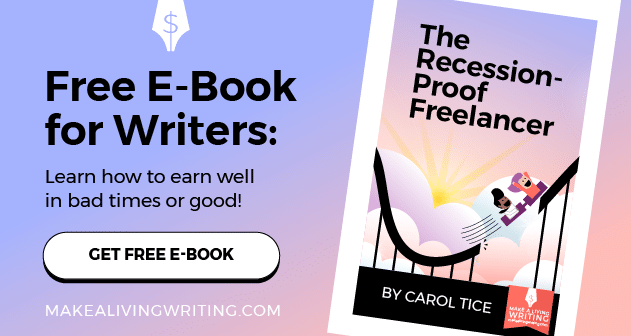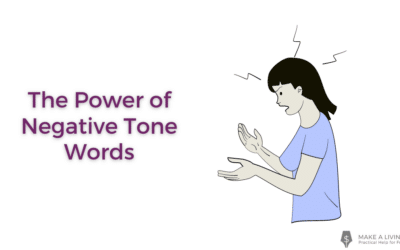Ever wonder if writing on your personal blog (for free) is worth your time?
Years ago, I found myself in a never-ending cycle when it came to freelance writing work. I would send tons of pitches for new writing jobs, and slowly but steadily, the work would come rolling in.
But then I found myself so busy with client work that I would stop pitching altogether. Eventually, I would finish all the work for my current clients, and find that my pipeline for the next month was pretty dry.
It’s a classic mistake. Sound familiar?
Then about eight months ago, I decided to start blogging once a week. I wanted to have a creative outlet and saw my personal blog as a fun hobby.
I didn’t think my blog would land me new freelance writing clients, but much to my surprise, it did. Increasingly, I started having potential clients find my blog, and then reach out to me about writing for them.
Now instead of always having to look for new work, I have freelance writing leads coming to me, which is the ideal scenario for any writer.
Want to learn how to use your personal blog to get freelance writing leads and clients? Here’s what you need to know.
1. Choose a niche for your blog
If you want to gain traction from your personal blog to find freelance work, then you need to have a specific niche. Having a niche gives you credibility, and it will make it easier for you to build an audience.
And ideally, your personal blog niche will fit in with your freelance writing niche, but it doesn’t have to.
- For instance, my freelance writing niche is finance, and the theme of my blog is freelance writing.
The important thing is that when clients come to your personal blog, they see that you’re a professional and that you understand how to write for an audience.
2. Optimize your blog posts for SEO
Whenever someone contacts me through my blog, I always ask how they found me. And more often than not, I learn that my leads found me from Google search.
(Editor’s Note: It’s actually how we found Jamie Johnson after another writer backed out of this specific guest post assignment.)
That’s not a happy accident — it was intentional. My blog ranks for specific keywords because I spent some time doing keyword research before I ever wrote my first blog post.
Optimizing your blog posts for SEO
It can feel like a daunting task, but it doesn’t have to be. I never spent money on expensive SEO tools and instead, used UberSuggest, which is a free keyword planner from Neil Patel.
UberSuggest helped me:
- Identify current issues with my website
- Discover pages with low word counts
- Flag pages that were taking too long to load
- Find keywords that had high search traffic, but were easy to rank for.
(And when you’re a new blogger, even a couple of hundred hits a month is considered “high search traffic!”)
Honestly, none of this work took very long, and my efforts started to pay off pretty quickly. About six months after I started blogging, I was ranking on the first page of Google for multiple keywords.
3. Write a new blog post once a week
Confession: I have tried (and failed) to start a personal blog many times. In the past, I never stuck with blogging, because I would try to commit to posting a new blog post multiple times every week.
Been there, done that?
In the beginning, I would always start off strong.
But after about a month, life would start to get in the way. I would have a week where I was busy with client work, and I wouldn’t be able to justify writing unpaid posts for my personal blog.
Not. Any. More.
Today, I only write a new personal blog post once per week. And to make it easier on myself to come up with new ideas, I have a Google spreadsheet full of topic ideas based on my keyword research.
Grab a copy and create your own. Click the link > File > Make a copy.
The only way you’ll be successful with your blog is if you stick with it consistently. So be realistic and choose a posting schedule that works for you. I think once a week is the ideal posting frequency for the purpose of generating inbound leads.
It takes time to get your blog to a point where it’s ranking in Google.
So in the meantime, make sure you’re sharing your new blog post on social media, like.
I also like to share blog posts in Facebook groups that allow promotional threads. I’ll share a link to my blog post with a brief description, and almost every time, at least one person will share it on Twitter or save it to Pinterest.
Remember, other bloggers are looking for things to post about on social media, too. So why not let them share your content for you?
Bottom line: If you don’t have a personal blog, then it’s time to start one
If you don’t currently have a personal blog, it’s time to start one! Blogging can be a great way to make a name for yourself and bring in a steady stream of freelance writing leads.
But you have to be strategic about it. Writing about rainbows and unicorns on your personal blog isn’t going to help you much. And a personal blog isn’t going to replace other types of marketing overnight.
You will most definitely still have to put yourself out there and continue pitching your services. But once you’ve used your personal blog to brand yourself as an expert, then even that will become easier over time.
Need help with your personal blog to generate freelance leads? Let’s discuss in the comment section below.
Jamie Johnson is a Kansas City-based freelance writer who writes about personal finance and small business.












